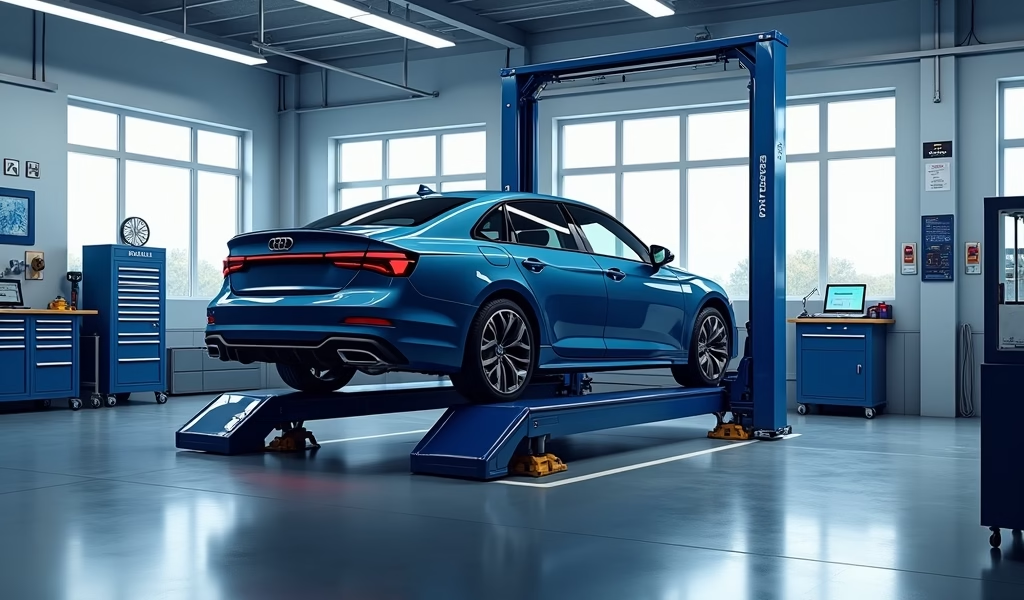Overview
This article provides a complete guide to car loan pre-approval, explaining how it gives buyers better negotiating power, protection from dealership financing tactics, and clarity on their budget before shopping. It offers step-by-step instructions for obtaining pre-approval, strategies to improve approval chances, common mistakes to avoid, and techniques for leveraging pre-approval effectively when shopping for a vehicle.
Table of Contents
- Understanding Car Loan Pre-Approval: Your Path to Purchasing Power
- 5 Game-Changing Benefits of Getting Pre-Approved
- How to Get Pre-Approved for a Car Loan: Step-by-Step Guide
- How to Improve Your Chances of Pre-Approval Success
- Common Mistakes to Avoid in the Pre-Approval Process
- Shopping for Your Dream Car with Pre-Approval in Hand
- Conclusion: Drive Away with Confidence
- Frequently Asked Questions
Understanding Car Loan Pre-Approval: Your Path to Purchasing Power
Did you know that 80% of car buyers who secure pre-approval before visiting a dealership report a significantly less stressful purchasing experience? That’s right—getting a car loan pre-approval is like having a secret weapon in your car-buying arsenal.
As an automotive financing specialist with over 15 years of experience, I’ve seen countless customers walk into dealerships unprepared, only to leave with terms that don’t serve their best interests. You deserve better than that uncertainty when making one of life’s major purchases.
A car loan pre-approval is essentially a lender’s promise to provide you with financing up to a certain amount based on your financial situation. It’s like having a blank check in your pocket when you walk onto the dealership lot—giving you clarity on your budget and serious negotiating power.
The pre-approval process involves a thorough evaluation of your credit history, income, and debt-to-income ratio to determine how much you can responsibly borrow. Unlike the on-the-spot financing offered at dealerships, pre-approval gives you time to compare options and find the best terms for your situation.
Think of it this way: you wouldn’t start building a house without knowing your budget, so why would you shop for a car without knowing exactly what you can afford? With pre-approved auto financing, you’re putting yourself in the driver’s seat of the car-buying process.
5 Game-Changing Benefits of Getting Pre-Approved
Securing car loan pre-approval offers advantages that transform your car-buying journey from potentially stressful to remarkably smooth. Let’s explore the five proven benefits that make pre-approval an essential first step in your car purchase strategy.
1. Know Your Budget Before Shopping
Walking into a dealership without knowing your budget is like going grocery shopping when you’re hungry—everything looks tempting, and you’ll likely overspend. Pre-approval establishes a clear price range, helping you focus only on vehicles within your financial comfort zone. You’ll know exactly what monthly payment fits your budget, preventing the common pitfall of falling in love with a car you simply can’t afford.
2. Enhanced Negotiating Power
When you’re pre-approved, you essentially become a cash buyer in the eyes of the dealership. This shifts the negotiation from the typical “What monthly payment can you afford?” to “This is my budget—what’s your best price?” This fundamental change in dynamics can save you thousands of dollars. According to Consumer Financial Protection Bureau research, pre-approved buyers often secure better deals because they can focus solely on the vehicle’s price rather than complicated financing terms.
3. Protection from Dealership Financing Tactics
Dealerships sometimes mark up interest rates from lenders, adding percentage points that benefit them but cost you significantly over the life of your loan. With pre-approval in hand, you have a benchmark interest rate to compare against the dealership’s financing offer. This transparency helps you avoid potentially predatory lending practices and ensures you get the fairest rate possible.
4. Streamlined Car-Buying Process
The car buying process is complex enough without financing uncertainties. Pre-approval eliminates a significant portion of the paperwork and waiting at the dealership. Many buyers report cutting hours off their time at the dealership simply because they’ve already handled the financing aspect of their purchase. You can focus on test drives and finding the right vehicle rather than waiting anxiously for credit approval.
5. Opportunity to Improve Terms
If you’re not satisfied with your pre-approval terms, you have time to shop around or improve your financial situation before committing to a purchase. This breathing room isn’t available when you’re sitting at the dealership’s financing office with a car you’ve already emotionally committed to buying. Pre-approval gives you the gift of time—perhaps the most valuable commodity in making sound financial decisions.

How to Get Pre-Approved for a Car Loan: Step-by-Step Guide
Securing car loan pre-approval doesn’t have to be complicated. Follow these straightforward steps to position yourself for success in the pre-approval process:
Check Your Credit Score First
Before applying anywhere, check your credit report and score. You’re entitled to one free credit report annually from each of the three major credit bureaus through AnnualCreditReport.com. Many credit card companies and financial institutions also offer free credit score monitoring. Understanding your credit standing helps set realistic expectations about interest rates and loan terms you might qualify for.
Gather Your Financial Documentation
Lenders will need proof of your financial situation, so have these documents ready:
- Proof of identity (driver’s license or passport)
- Proof of income (recent pay stubs, W-2 forms, or tax returns for self-employed individuals)
- Proof of residence (utility bills or lease agreement)
- Employment verification (employer contact information)
- List of current debts and monthly obligations
Having these documents organized before you apply streamlines the process and demonstrates your financial responsibility to potential lenders.
Research Potential Lenders
Cast a wide net when seeking pre-approval. Consider these options:
- Credit unions (often offer the most competitive rates for members)
- Banks (particularly where you already have accounts)
- Online lenders (convenient application process with competitive rates)
- Auto manufacturer financing (may offer special promotions)
Many financial experts recommend getting pre-approval from at least three different lenders to ensure you’re getting the best possible terms. Each institution has different criteria and may offer significantly different rates.
Submit Your Applications Within a Short Timeframe
When you apply for pre-approval, lenders will conduct a hard inquiry on your credit report, which can temporarily lower your credit score. However, credit scoring models typically count multiple auto loan inquiries as a single inquiry if they occur within a 14-45 day period (depending on the scoring model). Take advantage of this by submitting all your applications within a two-week window to minimize the impact on your credit score.
Compare Offers Carefully
Once you receive pre-approval offers, don’t just look at the interest rate. Consider:
- Annual Percentage Rate (APR)
- Loan term (length)
- Monthly payment amount
- Down payment requirements
- Prepayment penalties
- Fees and closing costs
The lowest interest rate doesn’t always translate to the best deal if other terms are unfavorable. Calculate the total cost of each loan over its entire term to make a truly informed decision.
Remember that most car loan pre-approvals are valid for 30-60 days, giving you a reasonable window to shop for your perfect vehicle while your rate is locked in. This timeline creates a healthy sense of urgency without rushing your decision-making process.
How to Improve Your Chances of Pre-Approval Success
Even if your credit isn’t perfect or your financial situation has some challenges, there are several strategic moves you can make to improve your chances of securing favorable car loan pre-approval terms. As a financing specialist, I’ve helped countless buyers with less-than-ideal credit profiles obtain affordable financing by following these proven techniques.
Address Credit Report Errors
Approximately 20% of credit reports contain errors significant enough to affect lending decisions. Before applying for pre-approval, review your credit report carefully and dispute any inaccuracies you find. Common errors include:
- Accounts that don’t belong to you
- Incorrect payment histories
- Outdated negative information
- Duplicate accounts
The credit bureaus are legally required to investigate disputes within 30 days, and removing errors can provide an immediate boost to your credit score.
Pay Down Existing Debt
Your debt-to-income (DTI) ratio significantly impacts your pre-approval chances. Lenders typically prefer a DTI below 36%, with no more than 15% allocated to auto expenses. If possible, pay down credit card balances and other loans before applying for car loan pre-approval. Even reducing balances without fully paying them off can improve your credit utilization ratio, potentially increasing your credit score.
For maximum impact, focus on high-interest debt first, but also consider targeting accounts that are near their credit limits, as this can have a more immediate positive effect on your credit score.
Save for a Larger Down Payment
A substantial down payment demonstrates financial responsibility and reduces the lender’s risk. Aim for at least 20% of the vehicle’s purchase price if possible. Not only does this improve your chances of approval, but it also:
- Reduces your loan-to-value ratio
- May qualify you for lower interest rates
- Decreases your monthly payment
- Helps avoid negative equity (owing more than the car is worth)
If saving 20% isn’t feasible, remember that any down payment is better than none. Each additional $1,000 you can put down typically reduces your monthly payment by about $15-20 per month on a 60-month loan.
Consider a Co-Signer with Strong Credit
If your credit history is limited or has significant negative marks, a co-signer with excellent credit can substantially improve your approval odds and help you secure better terms. A co-signer essentially promises to take responsibility for the loan if you default, reducing the lender’s risk.
This approach requires careful consideration and transparent communication. Your co-signer needs to understand that:
- The loan will appear on their credit report
- Their debt-to-income ratio will be affected
- They are fully responsible for payments if you cannot make them
A co-signer arrangement works best when both parties have clear expectations and trust. It’s also worth noting that some lenders offer co-signer release options after you’ve made a certain number of on-time payments.
Avoid Major Financial Changes
While preparing for car loan pre-approval, maintain stability in your financial life. This means:
- Staying with your current employer if possible
- Not opening new credit accounts
- Avoiding large purchases on existing credit
- Maintaining consistent banking patterns
Lenders value stability, and any significant changes in your financial profile could raise red flags. If you’re planning a career change or major purchase, consider timing it after your car loan is finalized.
Common Mistakes to Avoid in the Pre-Approval Process
Even savvy car buyers can fall into traps when seeking car loan pre-approval. My years of experience helping customers navigate auto financing have revealed these frequent pitfalls that you should carefully avoid:
Applying for Too Many Loans Over an Extended Period
While it’s wise to shop around for the best rates, spacing out your loan applications over several months can damage your credit score. Each application triggers a hard inquiry, and multiple inquiries spread out over time signal potential financial distress to lenders. Instead, concentrate your applications within a 14-day window so they’ll count as a single inquiry for credit scoring purposes.
I once worked with a client who applied to seven different lenders over three months, watching his credit score drop by nearly 40 points before he even found a car. Had he condensed those applications into two weeks, his score would have been minimally affected.
Focusing Solely on Monthly Payment
The monthly payment amount is just one piece of the financing puzzle. Borrowers who fixate only on keeping their payment low often end up with:
- Excessively long loan terms (72-84 months)
- Higher overall interest costs
- Increased risk of negative equity
Always calculate the total cost of financing by multiplying the monthly payment by the number of months in the loan term, then adding any fees. A slightly higher monthly payment on a shorter loan often saves thousands in interest over time.
Misrepresenting Financial Information
It might be tempting to inflate your income or downplay existing debts to secure better loan terms, but this approach inevitably backfires. Lenders verify employment, income, and other financial information. Discrepancies can result in:
- Denial of your application
- Withdrawal of pre-approval
- Potential accusations of fraud
Honesty establishes trust with lenders and helps ensure you get a loan that truly fits your financial situation. If you’re concerned about approval, consider strategies like increasing your down payment or finding a co-signer instead.
Ignoring the Fine Print
Pre-approval offers often come with conditions and contingencies that might affect your final loan terms. Critical elements to review include:
- Expiration date of the pre-approval
- Conditions for final approval
- Rate lock provisions
- Vehicle restrictions or requirements
- Prepayment penalties
I’ve seen customers shocked when their pre-approved 3.9% rate jumped to 5.9% because they didn’t notice their pre-approval was contingent on purchasing a vehicle less than four years old with under 50,000 miles. Always read and understand every document before proceeding with your car purchase.
Waiting Until You’re at the Dealership
Perhaps the most costly mistake is skipping pre-approval altogether and relying solely on dealership financing. This puts you at a significant disadvantage by:
- Limiting your negotiating power
- Restricting you to the dealer’s lending partners
- Creating pressure to accept terms quickly
- Potentially exposing you to rate markups
The dealership financing office should be your backup plan or point of comparison, not your primary financing strategy. As you explore the new car buying process, remember that preparation before visiting the lot is your strongest tool for success.

Shopping for Your Dream Car with Pre-Approval in Hand
Once you’ve secured your car loan pre-approval, you’re positioned for a dramatically different dealership experience. Here’s how to leverage your pre-approved status for maximum advantage when shopping for your next vehicle.
Keep Your Pre-Approval Private Initially
A strategic approach is to withhold information about your pre-approval during initial negotiations. When a salesperson asks how you plan to pay, simply state that you’re “taking care of financing” without elaborating. This prevents them from focusing on monthly payments and keeps the conversation centered on the vehicle’s total price.
Negotiations should always begin with the out-the-door price—the total cost including taxes, fees, and any add-ons. Only after you’ve agreed on this figure should you reveal your pre-approval as your financing solution.
Use Your Pre-Approval as a Negotiation Tool
When the time is right, your pre-approval becomes a powerful negotiating chip. It demonstrates that:
- You’re a serious buyer ready to complete the purchase
- You’ve already been vetted financially
- The deal won’t fall through due to financing issues
This position often motivates sellers to be more flexible on price or include additional features to secure your business. Your pre-approval essentially removes the uncertainty that sometimes causes dealers to be hesitant about discounting.
Still Consider Dealership Financing Offers
While your pre-approval sets a valuable baseline, remain open to dealership financing options, which sometimes include manufacturer incentives not available elsewhere. Some manufacturers offer promotional rates (sometimes as low as 0% APR) that might beat even the best bank pre-approval.
If the dealer offers financing, compare it objectively against your pre-approval by looking at:
- Total interest paid over the life of the loan
- Any required fees or charges
- Restrictions or conditions
Sometimes dealers will match or beat your pre-approved rate to keep the financing in-house. This creates a win-win scenario where your pre-approval has leveraged you an even better deal.
Stay Within Your Pre-Approved Amount
The dealership environment is designed to encourage spending. From the new car smell to the test drives in fully-loaded models, everything aims to create emotional connections to vehicles that might stretch your budget. Your pre-approval amount should serve as your absolute ceiling, not a starting point.
Remember to account for additional costs beyond the vehicle’s price:
- Sales tax (typically 6-10% depending on your location)
- Registration and title fees
- Documentation fees
- Extended warranties (if desired)
These can add thousands to your purchase price, potentially pushing you beyond your pre-approved limit if not carefully considered in advance.
Be Prepared for the Finance Office
Even with pre-approval, you’ll likely visit the dealership’s finance office to complete paperwork. This is where many buyers face pressure to purchase add-ons like:
- Extended warranties
- Gap insurance
- Paint protection
- Fabric guards
- Wheel and tire protection plans
Research these products’ actual values before your visit so you can make informed decisions rather than emotional ones. Remember that many of these products are available elsewhere at lower prices if you truly want them.
When making your final car buying decision, having a pre-approval gives you the confidence to focus on finding the right vehicle rather than worrying about whether you’ll qualify for financing. This psychological advantage alone can make your car shopping experience substantially more enjoyable and productive.
Conclusion: Drive Away with Confidence
Securing car loan pre-approval transforms what could be a stressful, uncertain car buying experience into one where you’re empowered and informed. By taking this proactive step, you’ve positioned yourself as a prepared buyer who understands the financial commitment of vehicle ownership.
The benefits of pre-approval extend far beyond just knowing your budget. You’ve gained negotiating leverage, protected yourself from potentially predatory financing practices, and created a framework for making rational decisions rather than emotional ones. This approach typically saves buyers thousands of dollars over the life of their loan—money better spent on other priorities or even future vehicle upgrades.
Remember that while dealers may offer competitive financing, your pre-approval ensures you’re never at their mercy. You’ve established a baseline that forces transparency in all financial discussions. This is the true power of preparation in the car buying process.
As you move forward with your vehicle purchase, maintain the disciplined approach that led you to seek pre-approval in the first place. Stick to your budget, resist unnecessary add-ons, and focus on finding a reliable vehicle that meets your needs rather than one that simply satisfies temporary wants.
By following the strategies outlined in this guide, you’re not just buying a car—you’re making a sound financial decision that balances transportation needs with fiscal responsibility. That peace of mind is perhaps the most valuable aspect of the car loan pre-approval process, allowing you to enjoy your new vehicle without the nagging worry that you’ve overextended yourself or agreed to unfavorable terms.
Now it’s time to take these insights and put them into action. Your dream car awaits, and with pre-approval in hand, you’re ready to drive it home on your terms.
Frequently Asked Questions
How long does car loan pre-approval typically last?
Most car loan pre-approvals remain valid for 30-60 days, depending on the lender. This gives you sufficient time to shop for vehicles while your rate remains locked.
Does getting pre-approved hurt my credit score?
Pre-approval requires a hard credit inquiry which may temporarily lower your score by a few points. However, multiple auto loan inquiries within a 14-day period typically count as just one inquiry for scoring purposes.
What’s the difference between pre-qualification and pre-approval?
Pre-qualification is an informal estimate based on information you provide, with no credit check. Pre-approval involves a formal application with credit check and verification, resulting in a specific loan offer you can use at dealerships.
Can I get pre-approved with bad credit?
Yes, but you may face higher interest rates or need a larger down payment. Lenders specializing in subprime loans can offer pre-approvals for borrowers with credit challenges.
Should I still get pre-approved if the dealer advertises 0% financing?
Absolutely. Dealership promotions like 0% financing often have strict qualification requirements. Having pre-approval gives you a backup plan and negotiating leverage even if you ultimately take the dealer’s financing offer.


Pingback: Pre Approved Auto Loan: 5 Car Care Tips - knowsyourcar.com
Pingback: How to Get Preapproved for a Car Loan? - knowsyourcar.com